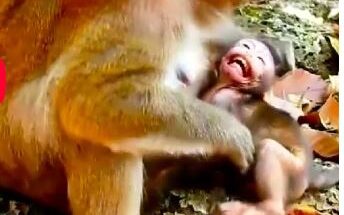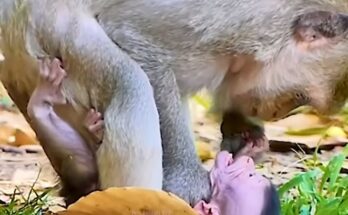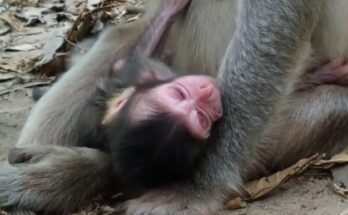In the animal kingdom, maternal love is often seen as one of the strongest forces of nature. From lionesses fiercely protecting their cubs to birds tirelessly feeding their chicks, the bond between mother and offspring is a universal sign of survival and care. However, sometimes, nature takes an unexpected and seemingly cruel turn. Among monkeys, a heartbreaking phenomenon occasionally unfolds— a mother rejecting her baby, leaving it desperate for the affection and care it instinctively seeks.
Such cases of maternal rejection in primates are not uncommon, yet they remain deeply unsettling. A baby monkey, born helpless and vulnerable, clings to its mother not just for nourishment but for emotional security. In primate societies, physical contact is vital; it regulates stress, ensures proper development, and teaches essential social skills. So, when a mother turns away, pushing her infant aside or actively avoiding it, the consequences can be devastating.
Why Would a Mother Reject Her Baby?
There are many potential reasons behind maternal rejection in monkeys. One of the most common factors is inexperience. First-time mothers, much like their human counterparts, may struggle to understand how to care for their newborns. Without guidance or strong maternal instincts, they may fail to form an attachment, leaving the infant to fend for itself.
Another reason is stress. In high-pressure environments, such as those in captivity or areas with scarce food resources, some mothers may prioritize their own survival over the needs of their offspring. When a mother is too weak, malnourished, or overwhelmed by social conflict within the troop, she may neglect or reject her baby entirely.
In some cases, a baby monkey might be born sick or weak, and the mother instinctively senses that it will not survive. This harsh form of natural selection allows the mother to conserve her energy for future offspring who have a better chance of thriving. It is a deeply distressing reality, but one that ensures the continuation of the species in the long run.
The Emotional Toll on the Infant
For a rejected baby monkey, the consequences are severe. Without maternal care, its survival chances drop significantly. Beyond physical nourishment, young primates require warmth, grooming, and social interaction. A mother’s embrace regulates the infant’s heart rate, reduces stress, and helps develop emotional resilience. Without it, the baby experiences immense psychological distress, often clinging desperately to anything that mimics a mother’s touch— even inanimate objects like cloth or fur substitutes.
Scientists have studied this phenomenon extensively, particularly through the work of psychologist Harry Harlow in the 1950s. His controversial experiments with rhesus monkeys revealed the devastating effects of maternal deprivation, showing that baby monkeys would cling to soft, cloth-covered models instead of wire “mothers” that only provided food. These findings reinforced the idea that emotional bonds are just as crucial as physical nourishment in early development.
A Cruel but Natural Reality
While heartbreaking, maternal rejection is not a sign of cruelty in the way humans understand it. It is a deeply ingrained survival strategy shaped by evolution. In the wild, resources are limited, and only the strongest are likely to make it. What appears to be a heartless bond may, in the broader scope of nature, be a necessary mechanism for species survival.
Yet, for the tiny, rejected monkey, all it understands is its longing for love— a love that, for reasons beyond its control, will never be returned.


